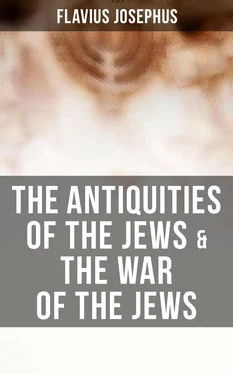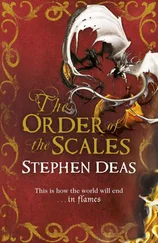1That a talent of gold was about seven pounds weight, see the description of the temple ch. 13. Nor could Josephus well estimate it higher, since he here says that David wore it on his head perpetually.
2Whether Josephus saw the words of our copies, 2 Samuel 12:31, and 1 Chronicles 20:3, that David put the inhabitants, or at least the garrison of Rabbah, and of the other Ammonite cities, which he besieged and took, under, or cut them with saws, and under, or with harrows of iron, and under, or with axes of iron, and made them pass through the brick-kiln, is not here directly expressed. If he saw them, as is most probable he did, he certainly expounded them of tormenting these Ammonites to death, who were none of those seven nations of Canaan whose wickedness had rendered them incapable of mercy; otherwise I should be inclinable to think that the meaning, at least as the words are in Samuel, might only be this: That they were made the lowest slaves, to work in sawing of timber or stone, in harrowing the fields, in hewing timber, in making and burning bricks, and the like hard services, but without taking away their lives. We never elsewhere, that I remember, meet with such methods of cruelty in putting men to death in all the Bible, or in any other ancient history whatsoever; nor do the words in Samuel seem naturally to refer to any such thing.
CHAPTER 8
How Absalom Murdered Amnon, Who Had Forced His Own Sister; And How He Was Banished And Afterwards Recalled By David
Table of Contents
1. When the king was returned to Jerusalem, a sad misfortune befell his house, on the occasion following: He had a daughter, who was yet a virgin, and very handsome, insomuch that she surpassed all the most beautiful women; her name was Tamar; she had the same mother with Absalom. Now Amnon, David's eldest son, fell in love with her, and being not able to obtain his desires, on account of her virginity, and the custody she was under, was so much out of order, nay, his grief so eat up his body, that he grew lean, and his color was changed. Now there was one Jenadab, a kinsman and friend of his, who discovered this his passion, for he was an extraordinary wise man, and of great sagacity of mind. When, therefore, he saw that every morning Amnon was not in body as he ought to be, he came to him, and desired him to tell him what was the cause of it: however, he said that he guessed that it arose from the passion of love. Amnon confessed his passion, that he was in love with a sister of his, who had the same father with himself. So Jenadab suggested to him by what method and contrivance he might obtain his desires; for he persuaded him to pretend sickness, and bade him, when his father should come to him, to beg of him that his sister might come and minister to him; for if that were done, he should be better, and should quickly recover from his distemper. So Amnon lay down on his bed, and pretended to be sick, as Jonadab had suggested. When his father came, and inquired how he did, he begged of him to send his sister to him. Accordingly, he presently ordered her to be brought to him; and when she was come, Amnon bade her make cakes for him, and fry them in a pan, and do it all with her own hands, because he should take them better from her hand (than from any one's else). So she kneaded the flour in the sight of her brother, and made him cakes, and baked them in a pan, and brought them to him; but at that time he would not taste them, but gave order to his servants to send all that were there out of his chamber, because he had a mind to repose himself, free from tumult and disturbance. As soon as what he had commanded was done, he desired his sister to bring his supper to him into the inner parlor; which, when the damsel had done, he took hold of her, and endeavored to persuade her to lie with him. Whereupon the damsel cried out, and said, "Nay, brother, do not force me, nor be so wicked as to transgress the laws, and bring upon thyself the utmost confusion. Curb this thy unrighteous and impure lust, from which our house will get nothing but reproach and disgrace." She also advised him to speak to his father about this affair; for he would permit him to marry her. This she said, as desirous to avoid her brother's violent passion at present. But he would not yield to her; but, inflamed with love and blinded with the vehemency of his passion, he forced his sister: but as soon as Amnon had satisfied his lust, he hated her immediately, and giving her reproachful words, bade her rise up and be gone. And when she said that this was a more injurious treatment than the former, if, now he had forced her, he would not let her stay with him till the evening, but bid her go away in the day- time, and while it was light, that she might meet with people that would be witnesses of her shame, — he commanded his servant to turn her out of his house. Whereupon she was sorely grieved at the injury and violence that had been offered to her, and rent her loose coat, (for the virgins of old time wore such loose coats tied at the hands, and let down to the ankles, that the inner coats might not be seen,) and sprinkled ashes on her head; and went up the middle of the city, crying out and lamenting for the violence that had been offered her. Now Absalom, her brother, happened to meet her, and asked her what sad thing had befallen her, that she was in that plight; and when she had told him what injury had been offered her, he comforted her, and desired her to be quiet, and take all patiently, and not to esteem her being corrupted by her brother as an injury. So she yielded to his advice, and left off her crying out, and discovering the force offered her to the multitude; and she continued as a widow with her brother Absalom a long time.
2. When David his father knew this, he was grieved at the actions of Amnon; but because he had an extraordinary affection for him, for he was his eldest son, he was compelled not to afflict him; but Absalom watched for a fit opportunity of revenging this crime upon him, for he thoroughly hated him. Now the second year after this wicked affair about his sister was over, and Absalom was about to go to shear his own sheep at Baalhazor, which is a city in the portion of Ephraim, he besought his father, as well as his brethren, to come and feast with him: but when David excused himself, as not being willing to be burdensome to him, Absalom desired he would however send his brethren; whom he did send accordingly. Then Absalom charged his own servants, that when they should see Amnon disordered and drowsy with wine, and he should give them a signal, they should fear nobody, but kill him.
3. When they had done as they were commanded, the rest of his brethren were astonished and disturbed, and were afraid for themselves, so they immediately got on horseback, and rode away to their father; but somebody there was who prevented them, and told their father they were all slain by Absalom; whereupon he was overcome with sorrow, as for so many of his sons that were destroyed at once, and that by their brother also; and by this consideration, that it was their brother that appeared to have slain them, he aggravated his sorrow for them. So he neither inquired what was the cause of this slaughter, nor staid to hear any thing else, which yet it was but reasonable to have done, when so very great, and by that greatness so incredible, a misfortune was related to him: he rent his clothes and threw himself upon the ground, and there lay lamenting the loss of all his sons, both those who, as he was informed, were slain, and of him who slew them. But Jonadab, the son of his brother Shemeah, entreated him not to indulge his sorrow so far, for as to the rest of his sons he did not believe that they were slain, for he found no cause for such a suspicion; but he said it might deserve inquiry as to Amnon, for it was not unlikely that Absalom might venture to kill him on account of the injury he had offered to Tamar. In the mean time, a great noise of horses, and a tumult of some people that were coming, turned their attention to them; they were the king's sons, who were fled away from the feast. So their father met them as they were in their grief, and he himself grieved with them; but it was more than he expected to see those his sons again, whom he had a little before heard to have perished. However, their were tears on both sides; they lamenting their brother who was killed, and the king lamenting his son, who was killed also; but Absalom fled to Geshur, to his grandfather by his mother's side, who was king of that country, and he remained with him three whole years.
Читать дальше












